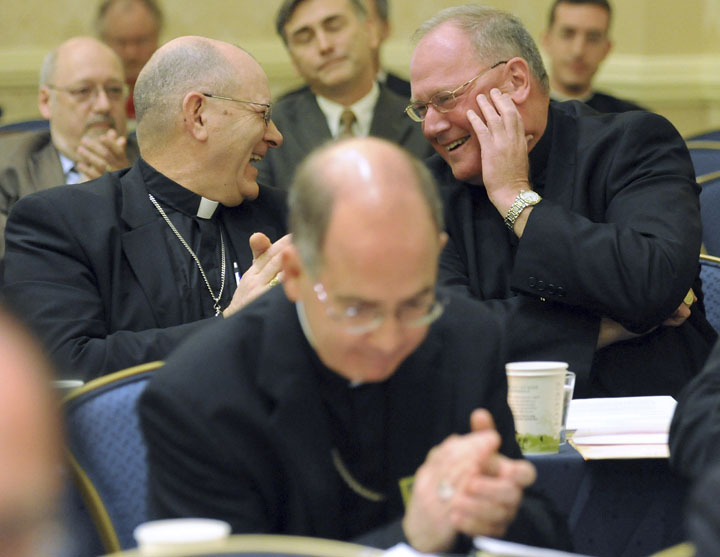BALTIMORE — New York Archbishop Timothy Dolan was elected today to be president of the U.S. Conference of Catholic Bishops in an upset victory over an Arizona bishop with a moderate style who is the sitting vice president.
It is the first time since the 1960s that a sitting vice president was on the ballot for conference president and lost. The outcome is the latest sign that the American bishops – divided over how best to uphold Roman Catholic orthodoxy – favor a more aggressive approach.
Dolan received 54 percent of the vote to 46 percent for Bishop Gerald Kicanas of Tucson, Ariz., on the third round of balloting. Kicanas has served as vice president for the last three years. Dolan said he shook hands with Kicanas after the vote and thanked him for his service. At a news conference, Dolan said he was surprised by the vote and noted it was “hardly a landslide.” Kicanas issued a short statement saying he respected the choice of his fellow bishops and praised Dolan for his “exceptional leadership qualities.”
The vote came at the annual fall meeting of the U.S. Conference of Catholic Bishops. Chicago Cardinal Francis George finishes his three-year term as president this week. The newly elected vice president is Archbishop Joseph Kurtz of Louisville, Ky., who defeated Denver Archbishop Charles Chaput, 62 percent to 38 percent. Kurtz is a leader in the bishops’ national campaign in support of traditional marriage.
“This is an indication that bishops are going to continue to be leaders in the culture wars,” said the Rev. Thomas Reese, author of a book on the American bishops and senior fellow at the Woodstock Theological Center at Georgetown University.
In Arizona, Kicanas had urged Catholic voters to ban gay marriage and joined anti-abortion rallies and events. However, he took a more conciliatory approach in some of the controversies that have polarized Catholics in recent years.
He has not denied Communion to any Catholic politicians and rejected calls to punish the president of the University of Notre Dame for honoring President Barack Obama, who supports abortion rights. Kicanas instead urged bishops and Catholic university presidents to start a discussion about their differences.
Dolan also does not outright deny the sacrament to dissenting Catholic lawmakers, but he is seen as a stricter defender of church orthodoxy in a style favored by many theological conservatives. By contrast, Kicanas was pilloried in the days leading up to the vote by right-wing Catholic bloggers, who urged readers to send protest faxes and leave messages for bishops at the hotel where they are meeting.
Robert George, a Princeton University scholar and an influential conservative Catholic voice, described Dolan as champion of Catholic ordodoxy with a record of working with people of other faiths – skills that will help build coalitions on social issues like marriage. Some bishops likely were worried the church has been too exposed to criticism by being outspoken in the public square, but the vote showed they are in the minority, he said.
“It means the bishops have decided to opt for a confident Catholicism,” George said. “They had a choice, and they chose the boldest, most outspoken bishop. You wouldn’t choose him as your leader unless you thought what he was doing in the capital of the world (New York) is what we want the church to represent.”
Still, Dolan rejected any suggestion that his fellow bishops chose him to shift directions of the conference.
“I mean it when I say I don’t think bishops sit around thinking about that,” the archbishop said.
The U.S. Conference of Catholic Bishops is an assembly of church leaders that helps them promote Catholic teaching. The organization coordinates collective statements by the bishops on key moral issues and public policy, such as immigration, health care and marriage. The conference also has a lead role in enacting child protection policies that the bishops adopted at the height of the clergy sex abuse crisis. Still, each bishop retains the authority to set church teaching in his diocese and answers only to the pope.
Dolan, 60, was installed as archbishop of New York just last year, after leading the Archdiocese of Milwaukee. Born in St. Louis, he was ordained in 1976. In 1985, he earned a doctorate in church history from Catholic University.
After working as a parish priest and professor, Dolan spent seven years as rector of the North American College in Rome, considered the West Point for U.S. priests, where he had studied for his own ordination. He is considered a talented public speaker and is very popular among his fellow bishops and priests.
Send questions/comments to the editors.


